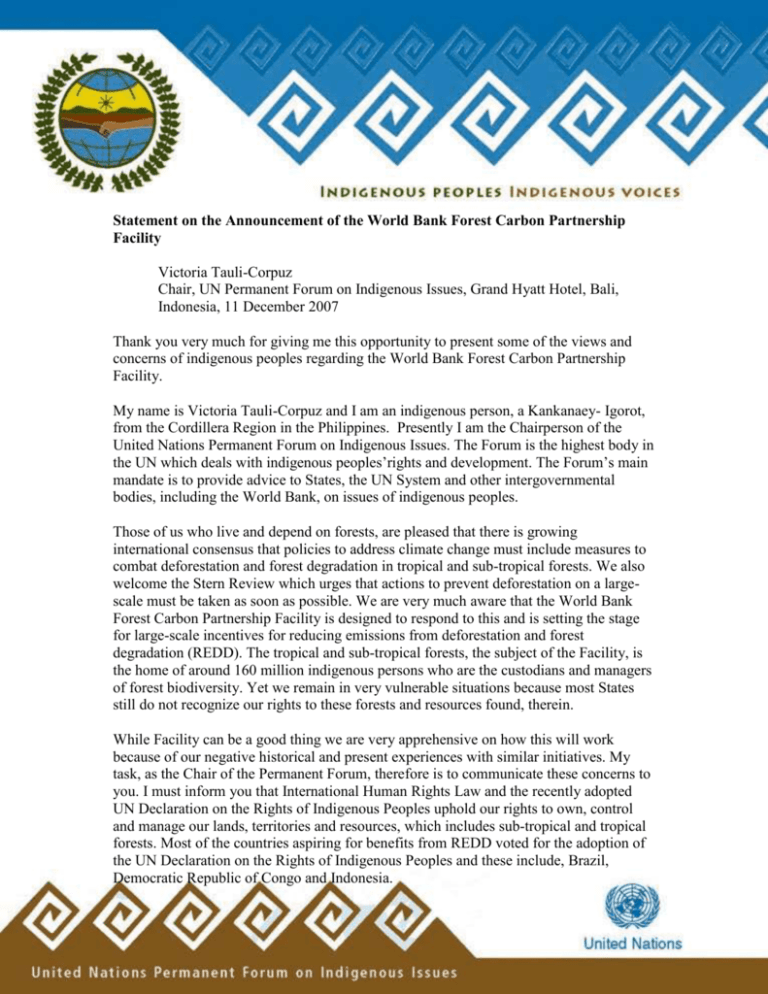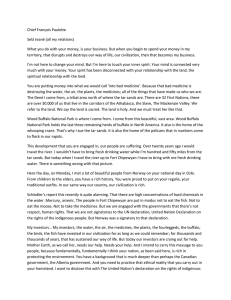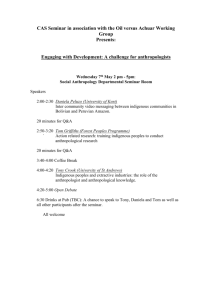MEDIA ADVISORY - the United Nations
advertisement

Statement on the Announcement of the World Bank Forest Carbon Partnership Facility Victoria Tauli-Corpuz Chair, UN Permanent Forum on Indigenous Issues, Grand Hyatt Hotel, Bali, Indonesia, 11 December 2007 Thank you very much for giving me this opportunity to present some of the views and concerns of indigenous peoples regarding the World Bank Forest Carbon Partnership Facility. My name is Victoria Tauli-Corpuz and I am an indigenous person, a Kankanaey- Igorot, from the Cordillera Region in the Philippines. Presently I am the Chairperson of the United Nations Permanent Forum on Indigenous Issues. The Forum is the highest body in the UN which deals with indigenous peoples’rights and development. The Forum’s main mandate is to provide advice to States, the UN System and other intergovernmental bodies, including the World Bank, on issues of indigenous peoples. Those of us who live and depend on forests, are pleased that there is growing international consensus that policies to address climate change must include measures to combat deforestation and forest degradation in tropical and sub-tropical forests. We also welcome the Stern Review which urges that actions to prevent deforestation on a largescale must be taken as soon as possible. We are very much aware that the World Bank Forest Carbon Partnership Facility is designed to respond to this and is setting the stage for large-scale incentives for reducing emissions from deforestation and forest degradation (REDD). The tropical and sub-tropical forests, the subject of the Facility, is the home of around 160 million indigenous persons who are the custodians and managers of forest biodiversity. Yet we remain in very vulnerable situations because most States still do not recognize our rights to these forests and resources found, therein. While Facility can be a good thing we are very apprehensive on how this will work because of our negative historical and present experiences with similar initiatives. My task, as the Chair of the Permanent Forum, therefore is to communicate these concerns to you. I must inform you that International Human Rights Law and the recently adopted UN Declaration on the Rights of Indigenous Peoples uphold our rights to own, control and manage our lands, territories and resources, which includes sub-tropical and tropical forests. Most of the countries aspiring for benefits from REDD voted for the adoption of the UN Declaration on the Rights of Indigenous Peoples and these include, Brazil, Democratic Republic of Congo and Indonesia. With all due respect to the Ministers present, the reality is that most governments or corporations have not played positive roles in preserving these remaining tropical and sub-tropical forests. We, the indigenous peoples, are the ones who sacrificed life and limb to save these because these are vital for our survival as distinct peoples and cultures. The indigenous peoples protected the Amazon from ranchers in Brazil, from loggers in Congo Basin countries and from commercial oil palm plantations and the forest industry in Indonesia. It is, therefore, a moral and legal imperative that indigenous peoples be fully involved in designing, implementing and evaluating initiatives related to REDD. The success of efforts to lower carbon emissions from reduced or avoided deforestation hinge primarily on whether indigenous peoples will throw their full support behind proposed mechanisms, such as the Forest Carbon Partnership Facility. It also rests on how coherent institutions, like the World Bank, are in terms of what activities are being financed. While you are establishing this Facility, you are also financing fossil fuel extraction which will negate the carbon emissions saved from avoiding deforestation. The following are some conditions which will determine whether indigenous peoples will support this or not. First, the Facility and other actors such as States, corporations and NGOs should unequivocally state that they recognize and respect indigenous peoples rights as contained in the UN Declaration on the Rights of Indigenous Peoples and that this will be the starting framework of any discussion or negotiations related to the access and use of resources of the Facility. Indigenous peoples’ free, prior and informed consent should be obtained before any initiative on REDD is pursued in their territories and forests. I imagine that donors and the private sector would not like to put their resources in high risk projects which will not genuinely involve indigenous peoples and other forestdwelling people. Secondly, their capacities should be enhanced to effectively address the drivers of deforestation as identified by the UNFF. Thirdly, if there is an acceptance of the Facility, indigenous peoples must have a representation in the governance structure at the same level as governments, donors and the private sector. Fourthly, consultations should be undertaken with indigenous peoples who are directly affected and pertinent documents should be translated in major languages understood by them and these should be disseminated before the consultations take place. As the Chair of the Permanent Forum on Indigenous Issues, I am committed to help facilitate such consultations and ensure that the UN Declaration on the Rights of Indigenous Peoples remains integral in the concept and implementation of mechanisms related to reduced emissions from deforestation. Contact: Vicky@tebtebba.org, mobile: Bali(+62805611936 : +639175317811









